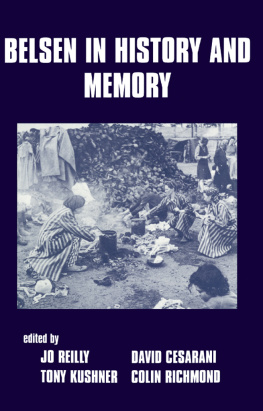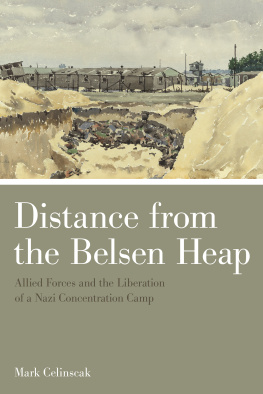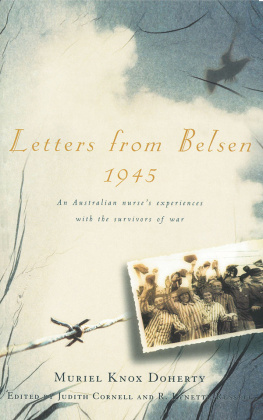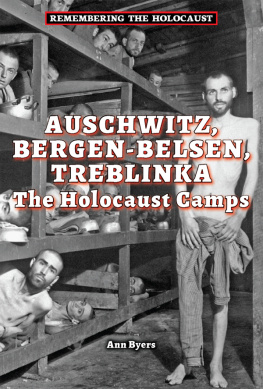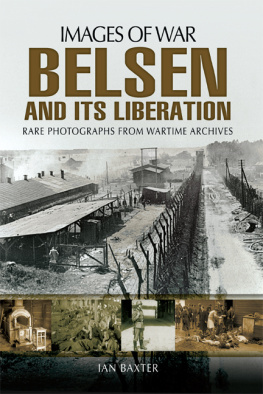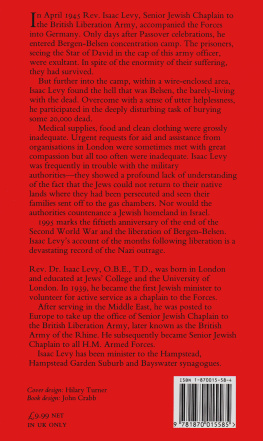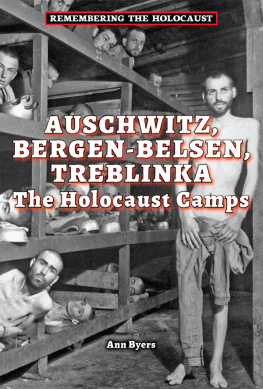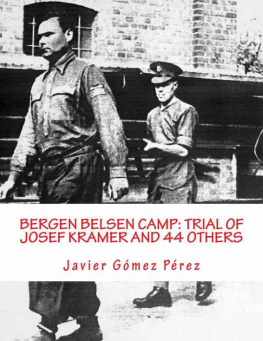Verolme - The Childrens House of Belsen
Here you can read online Verolme - The Childrens House of Belsen full text of the book (entire story) in english for free. Download pdf and epub, get meaning, cover and reviews about this ebook. year: 2008, publisher: SPUNC - Fremantle Press, genre: Non-fiction. Description of the work, (preface) as well as reviews are available. Best literature library LitArk.com created for fans of good reading and offers a wide selection of genres:
Romance novel
Science fiction
Adventure
Detective
Science
History
Home and family
Prose
Art
Politics
Computer
Non-fiction
Religion
Business
Children
Humor
Choose a favorite category and find really read worthwhile books. Enjoy immersion in the world of imagination, feel the emotions of the characters or learn something new for yourself, make an fascinating discovery.

- Book:The Childrens House of Belsen
- Author:
- Publisher:SPUNC - Fremantle Press
- Genre:
- Year:2008
- Rating:3 / 5
- Favourites:Add to favourites
- Your mark:
- 60
- 1
- 2
- 3
- 4
- 5
The Childrens House of Belsen: summary, description and annotation
We offer to read an annotation, description, summary or preface (depends on what the author of the book "The Childrens House of Belsen" wrote himself). If you haven't found the necessary information about the book — write in the comments, we will try to find it.
The Childrens House of Belsen — read online for free the complete book (whole text) full work
Below is the text of the book, divided by pages. System saving the place of the last page read, allows you to conveniently read the book "The Childrens House of Belsen" online for free, without having to search again every time where you left off. Put a bookmark, and you can go to the page where you finished reading at any time.
Font size:
Interval:
Bookmark:
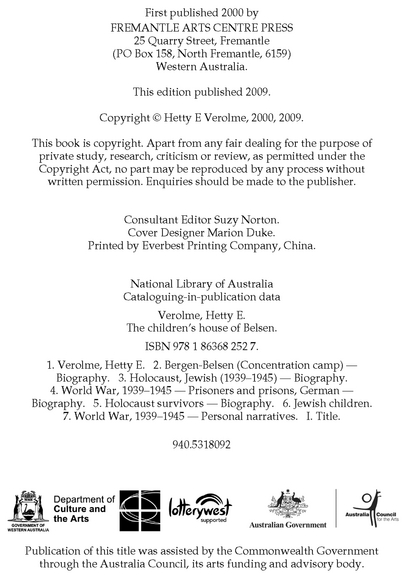
Hetty Verolmes stunning memoir is such an outstanding book that the judges had no hesitation in awarding it first prize. This is an important, moving and beautifully written book and deserves to become a classicin terms of its importance as testimony and the quality of its prose, it bears comparison with The Diary of Anne Frank.
a powerful and chilling account ... candid and vivid. The Australian
profoundly moving ... this is an arresting book ... an uplifting story. Australian Book Review
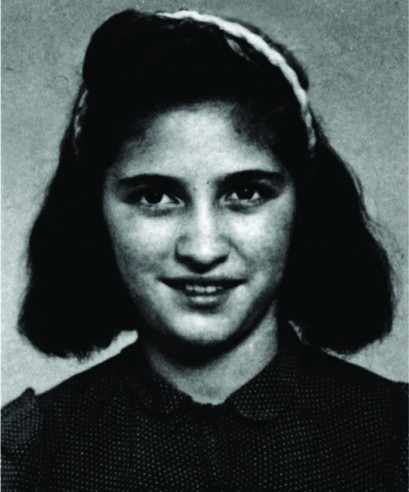
Image A: Hetty, twelve years old, 1942.
Hetty Esther Verolme was born in Belgium in 1930, and in 1931 her family moved to Amsterdam in the Netherlands. In 1943 she and her family were sent to the Nazi concentration camps.
After surviving the war and working for a time in the fashion industry, she emigrated to Australia in 1954. She worked in many jobs, from waitressing to bus conducting, from door-to-door retailing to selling real estate. She eventually established herself as a sucessful shopping centre developer.
In 1972, Hetty Verolme was presented with the Most Successful Migrant award. In 1977 she was appointed to the Australian Ethnic Affairs Council, and for many years she has been actively involved in a wide range of community and charity organisations.
September 1965
I live in Australia, a wonderful country of space, sunshine and equality, but above all, freedom. I own a comfortable home in the suburbs, and, of course, experience the ups and downs of everyday life. I have a lovely thirteen-year-old daughter who goes off to school each morning on the bus with all the other children, comes home, does her homework, watches television and eats well.
Often I look at my daughter as she, in her carefree way, tries to imitate the characters on television shows, and my thoughts return to the time when I was her age and the word freedom was something you read about in dictionaries.
I did not have such a carefree childhood. I spent years of my childhood in Belsen concentration camp in Germany, deported there by the Germans during World War II with my father and mother, and my two brothers.
If I were to tell you of the experiences of all our family this book would never come to an end, so I will confine myself to telling you the true story of my experiences in the Childrens House of Belsen.
My family lived in Amsterdam, in the Jewish quarter. It never used to be a Jewish quarter, as the Dutch people did not know the word segregation, and everybody could live wherever they wanted. Religion and belief were not considered an issue. Then, in 1941, during the German occupation of Holland, the Germans decided to concentrate the Jewish population in Amsterdam East.
In February 1941 the Germans raided the city market of Amsterdam in retaliation for the killing of a Dutch Nazi officer in a fight the previous day. Four hundred men were picked up and herded into trucks. Unfortunately, my fathers favourite cousin, Mauritz, was one of the men. Although we heard rumours, we had no idea where the men were taken. In May 1941 my father received a postcard marked Mauthausen. Mauritz wrote:
As we knew the card had to pass through the German censor, there must be a hidden message. After two days, my father had decoded the message. He came to me in the kitchen and said, I know what Mauritz wants to tell us. Dozeman is the name of the baker around the corner; Spitty is the name of our dog. So, what he is really trying to say is that he is very hungry and that it is a dogs life in Mauthausen.
We realised then that the Germans would be without mercy in their plans to eradicate the Jewish population in Holland. My father looked at me with worried eyes and said, I must do everything in my power to prevent us being sent to Germany.
There were many raids in the Jewish quarter during the summer of 1942. We saw families dragged from their homes, never to be heard of again. Some of these people were crying when they were taken away, others were relieved that the suspense of waiting was over. We watched through the curtains as the Germans marched long columns of people down the street to the station, where the trains would take them far away from the things they loved and lived for. My family used to feel very sad after each of these raids, as our friends and relatives disappeared, and God only knew what was happening to them.
Until now we had been very lucky. My father was a wellto-do textile merchant. When the raids started, someone told my father that we could buy our freedom from the German SS Commander, Aus der Funten, in the form of a work deportation exemption. We could then be exchanged for prisoners of war via Portugal.
My father did not hesitate. He sold most of his valuables and my mothers jewels and managed to get about five hundred thousand guilders together. He did not know whether this was enough money, but after talking it over with Mum, he decided to give it a try. The question was, who was going to approach Aus der Funten? The person would have to go to SS headquarters. This was dangerous many people had gone there and not returned. After a long discussion, Mum persuaded Dad to let her go. She reasoned that a woman might have a better chance of being admitted to see Funten.
On the sunny morning of 22 September 1942, my mother set out to walk the eight miles to try to save her family, as Jews were not permitted to travel on buses or trams. All day we lived a nightmare, trying not to think of all the things that might happen to our mother. The day dragged on, until at five oclock that afternoon the telephone rang. After some hesitation my father picked up the receiver, afraid of what he might hear, but then his face transformed into a smile. Mum was all right and on her way back home. Imagine our happiness when Mum arrived tired but safe a few hours later. Dad said that he would never permit her to do a thing like that again, as he had died a thousand times during the day. Mum smiled happily, her mission completed. She had spoken to Aus der Funten, and was told to come back with the money and our passports the next week. She was also instructed to have suitcases prepared with clothes for all of us so that we could be ready at a moments notice for our trip to freedom. How wonderful! Our spirits lifted. Soon we might live in freedom again, as human beings, without being shunned or hunted.
The next day we all had our pictures taken and our fingerprints were put on our passports. The week passed and Mum set out once more for the SS headquarters. Another unbearable day loomed ahead of us, but this time Mum came home earlier, with photocopies of our precious passports, stamped by order of Aus der Funten, The holder of this passport is exempt from work deportation. The work deportation exemption protected us from being taken away during the raids which went on night after night. We desperately wanted to believe the Aus der Funtens verbal promises that we would be exchanged for prisoners of war.
Font size:
Interval:
Bookmark:
Similar books «The Childrens House of Belsen»
Look at similar books to The Childrens House of Belsen. We have selected literature similar in name and meaning in the hope of providing readers with more options to find new, interesting, not yet read works.
Discussion, reviews of the book The Childrens House of Belsen and just readers' own opinions. Leave your comments, write what you think about the work, its meaning or the main characters. Specify what exactly you liked and what you didn't like, and why you think so.

